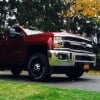First Drive: Chevy Colorado ZR2 Bison
-
Similar Content
-
- 3 replies
- 5,971 views
-
- 3 replies
- 1,179 views
-
- 20 answers
- 6,823 views
-
- 0 answers
- 4,714 views
-
- 0 replies
- 1,053 views
-
-
Recently Browsing 0 members
- No registered users viewing this page.
-
Forum Statistics
247.5k
Total Topics2.6m
Total Posts -
Member Statistics
-
Who's Online 19 Members, 0 Anonymous, 1,497 Guests (See full list)



















Recommended Posts
Join the conversation
You can post now and register later. If you have an account, sign in now to post with your account.